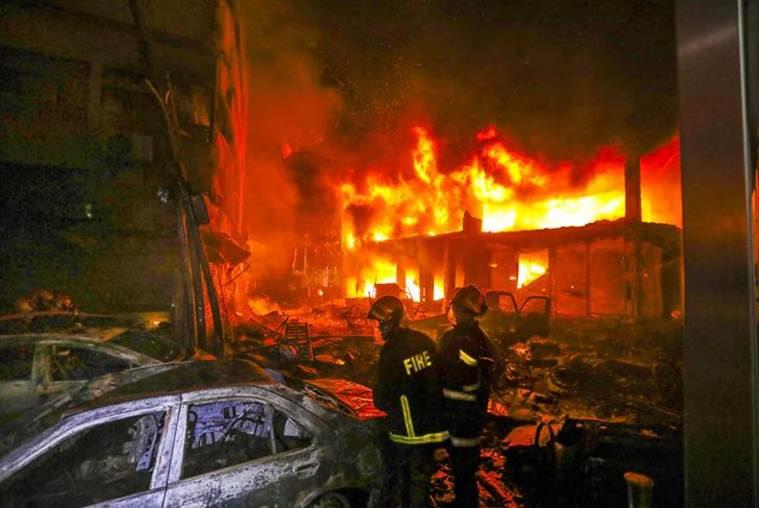
A scene from the burning Secretariat building, Dhaka: December 25, 2024
The recent incident of fire on the Christmas day at the Bangladesh Secretariat building in the capital city, Dhaka, a building which is the highest seat of the government where important government documents have been burnt and parts of the building been destroyed, has shaken the country, raising questions about the efficacy and credibility of the Interim Government (IG) and that of the leader of the IG, Nobel Laureate, Professor Muhammad Yunus in ensuring the safety and security of the country.
Thus, many argue and not without reasons that Prof. Yunus is more about self than the country and that he does not go into the details of things and at times, gets impatient and these callous attributes have made the IG non-functioning. There have been allegations that in their 4-month stay in the government, the IG and Prof. Yunus have little to show in terms of accomplishments.
There is some truth in these allegations. Indeed, we may fault and quite legitimately the IG and more particularly, Prof Yunus on many things that they have failed to accomplish but at the same time, let us also not forget it is his good standing with the West especially, the US that has saved us from what looked like an imminent incursion from an external force that threatened to unseat the IG and made the return of the deposed and much despised Hasina government a near reality. But it did not and this is because the international standing of Prof. Yunus stood in the way.
Furthermore, let us also not forget that the revolution needed a face that was credible and acceptable to most people within Bangladesh, and Yunus fulfilled this important requirement adequately.
Therefore, whether we like it or not, Yunus is our only option. Indeed, I cannot think of anyone other than Yunus meeting these crucial criteria. Without Yunus at the helm, there would have been and will be utter chaos if not bloodletting in the country and reversal of the revolution.
True, in governance, the IG has not done as well as people expected it to. Some of IG’s failures should not blind our vision from several important accomplishments that are not visible in public eyes but those that have been key in keeping the economy and the country moving, and these include but not limited to the following (i) some semblance of stability; (ii) improvement in the balance of payment conditions; (iii) prevention of a run-away inflation; and (iv) publication of the White Paper – an empirical unmasking of the extent and depth of corruption of the Hasina government etc. etc. which also revealed the areas where mega-corruption takes place and occurred in the recent past. We must duly recognize and appreciate these important accomplishments of the IG.
Impediments to implementation of reforms are numerous and among these, the fact that the IG has to operate through the existing administrative and security frameworks that are filled with the Awami League (AL) loyalists who not only have a vested interest in maintaining the status quo of abuse but their blind loyalty to the deposed AL and its deified leader, commit them to sabotage every effort of the IG that threaten their personal and those of their party’s agenda, have made its tasks incredibly daunting. Furthermore, the existing public administration systems and norms and not to speak of on-going cacophony of the long-dormant now impatient, Bangladesh Nationalist Party (BNP) have made the tasks of implementation policies of the IG equally challenging.
Indeed, these are intractable challenges cannot be remedied under the existing norms and rules of the public administration and that the existing norms and practices compelled the IG to adopt a go-easy approach, that has failed miserably and yet, an alternative, especially under the existing administrative arrangements, is not possible.
So, what is the way forward?
As a dark alley often leads to a bright opening, I believe that the Secretariat fire incident which no doubt is an evidence of inefficacy of the IG, and which at the same time, has revealed rather starkly that the enemy is within and not outside, may also have offered an opportunity, a perfect moral and legal space, for the IG to move fast and harsh, through declaration of a state of emergency, weed out the fifth columnists in the administration – civil and security – once and for all, and implement some of the reforms that are key to stabilising the economy, in improving law and order, building citizen trust in the government and measures that would create plain level and cleaned-up field for the democratic transition of the country.
Finally, as performance and integrity of some of the Advisers have been questioned in recent times, reconstitution of the IG with more efficient, and bold Advisors with Prof. Yunus continuing as its head, may indeed be the way forward.
With Prof. Yunus continuing as the leader of a reconstituted IG and an administrative arrangement under Emergency Law that would allow fast and uncompromising implementation of corrective measures is the only viable way to steer Bangladesh to transit to a reformed democratic state.
